 In yesterday’s post, we looked at how some churches are trying to attract people and asked the question:
In yesterday’s post, we looked at how some churches are trying to attract people and asked the question:
Are churches essentially bait-and-switching people when they say “come to our church because of what is in it for you” to get people in the door and then turn around and say, “Christianity is not about what’s in it or you but it’s about loving, serving, sacrificing, and giving to others?”
As you might expect, churches that are appealing to the “felt needs” of the people in their community don’t view it that way.
It just so happened that at the same time I was reading The Divine Commodity (affiliate link), my church small group was discussing a video series by Pastor Andy Stanley about sharing your faith with others called “Go Fish.” In one of the videos Andy Stanley makes the case that everyone initially follows Jesus because of what’s in it for them.
If you are a Christian, do you remember your initial motive for following Jesus?
- Was it because you were afraid of hell?
- Was it because you want to live forever in a place where there is no more pain, suffering, illness, and violence?
- Was it because you were addicted to drugs or alcohol and had nowhere else to turn?
- Was it because your marriage was in the ditch and only divine intervention could save it?
- Was it because you lost a loved one and looked to God to make sense of it.
Guess what? Those are all selfish motives.
Part of being a follower of Jesus is what the Bible calls “sanctification,” that is the process through which God takes our screwed-up, self-centered, conniving, manipulative, egotistical selves and begins to transform us into loving, joyful, kind, selfless people like Jesus.
Did you catch that? It’s a process.
Pastor Rick Warren once explained it this way.
The very first words of Jesus that He says to His disciples are “Come and see.” Now that’s the entry point for faith. What is the commitment level of “Come and see?” Nothing. Just show up. Sit in the back. Don’t sing anything, say anything, sacrifice anything. Just show up. But Jesus never left them there.
And from “Come and see,” He took them through consistent steps. And all through the three and a half years of ministry, he is turning up the heat. And as they begin to follow Him, He starts saying, “You’re my disciple if…” And He redefines commitment. “You’re my disciple if you love one another.” “You’re my disciple if you bear fruit.” “You’re my disciple if you take up your cross, deny yourself, and follow Me.” And on and on, He’s turning up the heat.
In those days, nobody took up a cross unless the Romans were going to nail him to it. So He’s saying, “Come and die.” There’s a huge difference in commitment between “Come and see” and “Come and die.” He doesn’t say “Come and die” at the very first. He takes three years into a relationship with them. And He’s moving them.
(2008 Exponential Conference, transcript by Kent Shaffer at ChurchRelevance.com)
Could you imagine a church going with “Come die with us!” as the slogan for their outreach campaign?
Can you say… Worst. Outreach. Strategy. Ever.
I mean nobody could be so clueless…
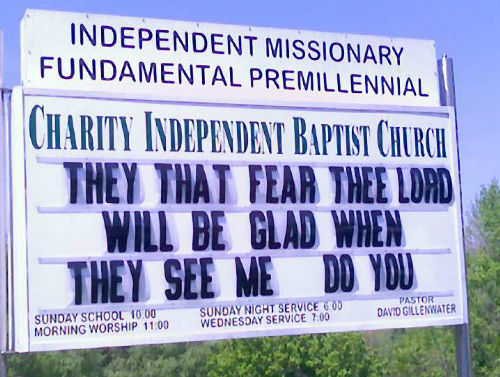
or callous…
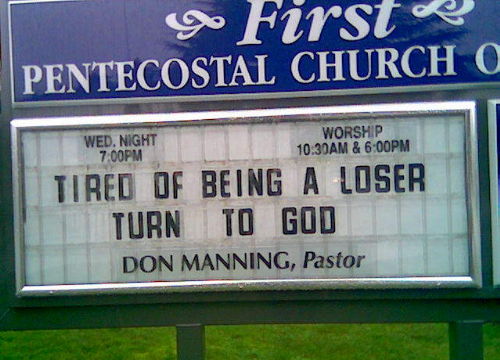
to think the way to draw a person to Christ…
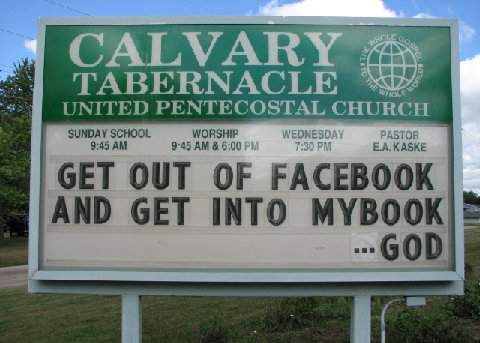
is to tell them they first need to sacrifice…
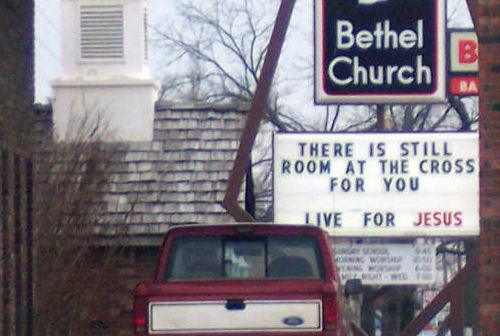
for a God they don’t even know…
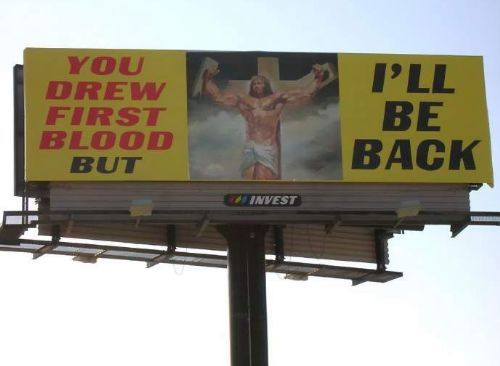
Right?
If you believe God really transforms lives, then shouldn’t you try to reach people where THEY are rather than where YOU are?
If it sounds like I’m saying exactly the opposite of what I said yesterday, well I am… sort of. I’ll clarify that in the final post in this series tomorrow. But for now I’d like to hear what you think about this…
If our churches are going to reach self-centered consumers “where they’re at,” don’t we have to appeal to their selfish desires?
I hear what you’re saying…and I need to chew on it more.
My knee jerk reaction is that when we show people who God is only in relation to what He can do for us, then we reduce Him. I think that ideally, we try to participate in revealing God to people – His majesty, his holiness, His glory, His love, His grace. Even non Christians, if they are somewhat well adjusted, react to a revelation of the size of the universe with a sense of awe, humility, and insignificance.
I think Isaiah’s first reaction to seeing God was awe, followed by a realization of who he was by contrast: “Woe is me! I am ruined!” God gives grace to the humble, and He did so here. Isaiah’s response to having seen God, then having received grace from this God, was to say “Here am I, send me!” God had only said “who shall I send?” He hadn’t said what He wanted to send anyone to actually do, but Isaiah didn’t wait to hear what the assignment was, because it didn’t matter. His response was just “I have seen You. I have received undeserved Grace from You, which means I get to live for You, so it doesn’t matter what you need me to do, just send me, because nothing else matters.”
I think that – again, ideally – our goal is to facilitate (if you’ll forgive me for using that word) that kind of defining moment for people, to be used by God to reveal Him to others, not so much for what He can give them, but in terms of Who He is.
But you’re right. The Gospel that was preached to me as a child was that I’ve got either Heaven or Hell waiting for me, and only Jesus can get me out of Hell and into Heaven. It wasn’t until later in life that I went from thinking of God as my divine fire insurance to humbly realizing that God is glorious, and His glory doesn’t depend on whether or not He’s delivering me from Hell. The fact that I get to behold Him and live for Him at all is an infinitely undeserved mercy and joy.
Oops. Forgot my concluding statement.
I meant to say – again, good stuff. It’ll keep me thinking for a while.
Chris, thanks for your comment and for continuing to be a part of this conversation. You make some great points, especially about the difference between focusing on who God is rather than what he can do for us.
Paul, I am thrilled that I have been visiting your blog lately. Awesome posts! We look at the church of Acts and see that thousands were giving their life to Christ daily. They knew upon doing this that they would either be killed or put in jail. Can we ever get back to that church?